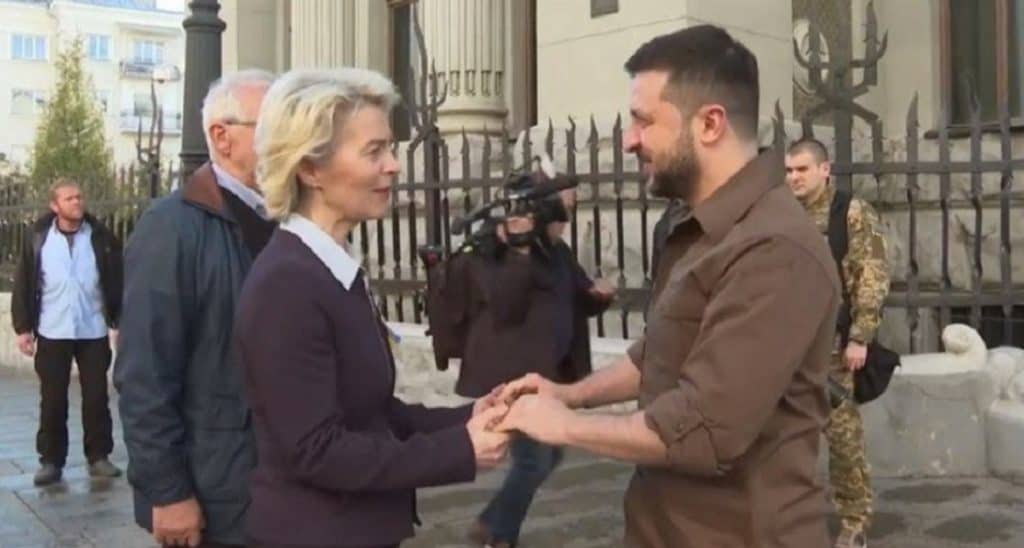Part two of the article: The War in Ukraine: In a Search for the Efficient Frontier
By Dragan Vitorovic
A Geopolitical Stalemate – As the war in Ukraine lasts for more than six months now, it is becoming obvious that Europe could be much more exposed to the various adversarial effects of Russian activity in Ukraine than initially expected.

Additionally, the European relationship with China, reflecting on the changing geopolitical landscape, may introduce additional political risks in the near future.
Arguably, European Union is not fully prepared for big geopolitical changes and the significant adjustment of the international order. The EU, given the devastating first-order effects of pandemics, should have established the framework for a New Social Contract, one that could address the challenges posing a significant risk to the European set of values. After the Russian invasion, the EU found itself to represent a younger partner in the Euro-Atlantic relationship, without a fiscal and banking union that could have provided a cushion to the bloc against the incoming economic and financial risks.
Additionally, the EU currently has a military conflict on its periphery, and the traditionally unstable Balkans, a region that has been mismanaged for more than a decade. Concerning Ukraine, the EU is in a challenging position, being overexposed both to the United States and Russia, albeit in a different, incongruent manner. The Balkan countries will be even more under the Chinese economic influence as long as the European Union continues with its short-sighted politics, and this might become a serious challenge to the European Union in the medium term.
Given the future relations between the European Union and China, they will be partially influenced by the Chinese questionable involvement in the Ukraine conflict. The EU and China already have a complex network of relationships. The EU trade deficit in trade with China in 2020 reached EUR 181 billion, while China still has problematic practices in treating the companies from the EU willing to do business in China. China is an indispensable trade partner of the European Union, however, there is a risk that the trade routes and the supply chains might be distorted due to sanctions against Russia (barring the route through St. Petersburg, is one of the examples of aggravated risk spurring from the events in Ukraine). One of the responses in a business domain, potentially provoked by the Chinese role in supporting Russia, would be the adoption of enhanced, in-depth due diligence on the behalf of the EU companies cooperating with Chinese counterparts, including the demand for high-quality contracts and reconsideration of their enforceability.
Additionally, the EU and China are competitors in Africa, battling for political influence and the space for investments. So far it seems that China has more advantages than the EU, partially because of the colonial past and the African mistrust of the Europeans. The outlook on Russia is not unfavorable in Africa, so China could leverage its neutral pro-Russian stance in this region, which, ironically, puts the EU at a disadvantage.
Concerning the sanctions, introduced by the European Parliament in 2020 – 2021, against the Chinese officials allegedly responsible for Xinjiang atrocities, later to be countered by the Chinese sanctions against the Members of the European Parliament, this development could signal in which direction the EU could move if the Chinese involvement in Ukraine is to be deeply scrutinized. It is a matter of political will.
One of the most recent developments is the discouraging change in the EU – Chinese space cooperation. A recent article published by The Diplomat speculates that possibly distorted space cooperation, between the European Space Agency and the Chinese counterpart, could trigger further technological and political distancing between the European Union and China. The core of the issue, according to the article, is the Chinese weaponization of its space program and the Chinese extensive support for the Russian aggression against Ukraine.
The Uncharted Waters Ahead
For some authors, such as Margaritis (2022) the pressure of the West on Russia, leading to its partial exclusion from the international policy-making circles, has the end goal of subduing China and limiting its political influence. If true, this could partially explain the official stand of Chinese foreign policy.
Concerning the situation in Ukraine and the broader implications, it will be difficult, if not impossible, to re-establish the international security order without Russia. Historically speaking, Russia has been, in one form or another, a part of every strategic change on a global scale for almost three centuries. The processes of global change, including the re-arrangement of alliances, as well as energy and food supply chains, could be irreversible and the EU is overexposed to various risks that cannot be diversified instantaneously. New supply chains, different trade routes, and redesigned security frameworks will certainly include Russia with or without the implicit acceptance of the European Union.
While Europe is familiar with the Russian strategic culture and has a complex relationship with Russia lasting for three centuries, there is no recent track record of Chinese behavior being among the leading economies or superpowers. This represents a significant risk for the European policymakers, for a long time overshadowed by their colleagues on the other side of the Atlantic, especially in a consideration of the security arrangements.
The recent joint statement of Russia and China, being much less normative and vague than the sole Chinese official declarations, signals the common emotional position of the two superpowers, as well as the resentment towards the West. The joint statement lists several strategic areas of cooperation, with a relatively clear set of objectives. Even in the case of wishful thinking of both China and Russia, the EU should have a well-measured and well-articulated response to their joint statement, especially when considering sensitive industries of the future, such as bioengineering and Artificial Intelligence (AI).
As a final point, it is worth noticing that the Chinese stance on the Russian involvement in Ukraine is far from being fixed, and it may adjust, depending on the time frame and for how long the Ukrainian tragic episode could drag on. Ironically, the relationship between China and the European Union could become overly dependent on the outcome of the Russian invasion, even as a second-order effect.
In a scenario where a relationship between the EU and China becomes too much influenced by the Russian invasion, the Western Balkans countries could seek further economic cooperation with China. This geoeconomic development could generate the additional political risks for both the EU, and especially for the countries of the Western Balkans, known for their political sensitivity.
Author: Dragan Vitorovic
(The views expressed in this article belong only to the author and do not necessarily reflect the editorial policy or views of World Geostrategic Insights).







